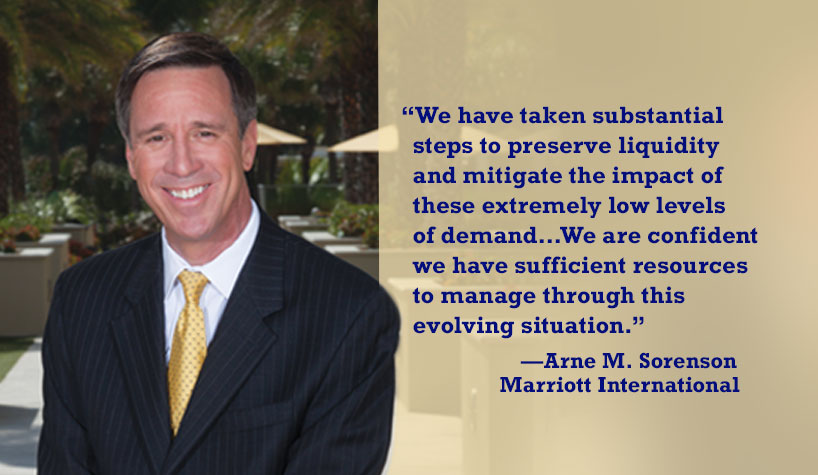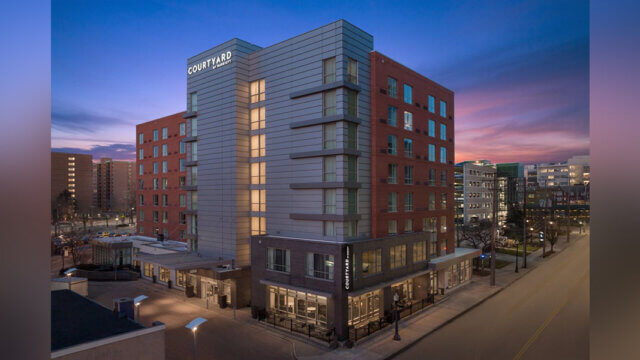BETHESDA, MD—Marriott International Inc. has reported its first quarter 2020 results, which were dramatically impacted by the COVID-19 global pandemic and efforts to contain it.
Arne M. Sorenson, president/CEO of Marriott International began Marriott’s earnings call by noting that this marked the first time the company’s leadership team was not in the same room to report its earnings. He also said that the pandemic is the most unprecedented event Marriott has faced, which includes domestic tragedies, economic downturns and natural disasters. “That’s saying a lot,” Sorenson said.
“In the last few months we have seen the impact of COVID-19 spread throughout our business in an unprecedented way,” Sorenson said. “Worldwide RevPAR began the year with a strong 4.6% growth rate for January, excluding Greater China, where COVID-19 was already impacting results. For the first two months of the year, worldwide RevPAR grew 3.2 %, excluding the Asia-Pacific region. As the pandemic moved around the world, we saw global RevPAR fall sharply and, in April, worldwide RevPAR declined approximately 90%. Currently, roughly a quarter of our worldwide hotels are closed.”
Sorenson expressed confidence that travel will rebound, as the company is seeing hope overseas. He also said in the call that Marriott plans to reopen its properties in phases parallel with government and health organization guidance.
“The resilience of travel demand is evident in the improving trends we see in Greater China. Occupancy at our hotels in the region reached 25% in April, up from less than 10% in mid-February 2020,” he said.
“Looking at our occupancy and booking trends, it appears that lodging demand in most of the rest of the world has stabilized, albeit at very low levels. Occupancy was around 20% over the past two weeks in North American limited-service hotels, benefitting from leisure and drive-to demand,” he added.
“We have taken substantial steps to preserve liquidity and mitigate the impact of these extremely low levels of demand. In addition to reducing our operating expenses dramatically, in mid-April we issued $1.6 billion of senior notes and, last week, we announced amendments to our existing co-brand credit card agreements with JPMorgan Chase & Co. and American Express, raising $920 million of additional liquidity. We are confident we have sufficient resources to manage through this evolving situation,” Sorenson said.
First Quarter 2020 Results
Marriott’s reported operating income totaled $114 million in the 2020 first quarter, compared to 2019 first quarter reported operating income of $510 million. Reported net income totaled $31 million in the 2020 first quarter, compared to 2019 first quarter reported net income of $375 million. Reported diluted earnings per share (EPS) totaled $0.09 in the quarter, compared to reported diluted EPS of $1.09 in the year-ago quarter. Reported results in the 2020 first quarter included impairment charges, bad debt expense, and guarantee reserves of $193 million pretax ($148 million after-tax and $0.45 per share), related to COVID-19.
Adjusted operating income in the 2020 first quarter totaled $192 million, compared to 2019 first quarter adjusted operating income of $655 million. Adjusted operating income in the 2020 first quarter included impairment charges, bad debt expense and guarantee reserves of $180 million, related to COVID-19.
In the 2020 first quarter, worldwide RevPAR declined 22.5% (a 22.7% decline using actual dollars). North American RevPAR declined 19.5% (a 19.5% decline using actual dollars), and international RevPAR declined 30.4% (a 31.3% decline using actual dollars).
First quarter 2020 adjusted net income totaled $85 million, compared to 2019 first quarter adjusted net income of $482 million. Adjusted diluted EPS in the first quarter totaled $0.26, compared to adjusted diluted EPS of $1.41 in the year-ago quarter. These 2020 first quarter adjusted results included impairment charges, bad debt expense and guarantee reserves of $138 million after-tax ($0.42 per share), related to COVID-19. Adjusted results exclude merger-related costs and (recoveries) charges, cost reimbursement revenue and reimbursed expenses.
Base management and franchise fees totaled $629 million in the 2020 first quarter, compared to base management and franchise fees of $732 million in the year-ago quarter. The year-over-year decline in these fees is primarily attributable to RevPAR declines related to COVID-19, partially offset by unit growth and an increase in other non-RevPAR related franchise fees. Other non-RevPAR related franchises fees in the 2020 first quarter increased $7 million compared to the year-ago quarter, largely due to an increase in residential branding fees. Credit card branding fees were roughly flat year over year.
Adjusted earnings before interest, taxes, depreciation and amortization (EBITDA) totaled $442 million in the 2020 first quarter, compared to first quarter 2019 adjusted EBITDA of $821 million. First quarter 2020 adjusted EBITDA included $79 million of bad debt expense and guarantee reserves, related to COVID-19.
Selected Performance Information
The company added 88 new properties (14,525 rooms) to its worldwide lodging portfolio during the 2020 first quarter, including nearly 2,100 rooms converted from competitor brands and approximately 7,200 rooms in international markets. Eighteen properties (3,670 rooms) exited the system during the quarter. At quarter-end, Marriott’s global lodging system totaled more than 7,400 properties and timeshare resorts, with nearly 1,392,000 rooms.
“Hotel owners continue to show their preference for our brands. Rooms signed during the quarter were in line with the year ago quarter, and our development pipeline grew slightly to nearly 516,000 rooms, with 45% under construction. At the end of the first quarter, our rooms distribution around the world in 134 countries and territories had grown by 4.4% compared to one year prior. While we expect COVID-19’s dramatic impact on the global economy will likely result in significantly lower new room openings than we had budgeted for 2020, we are already seeing an uptick in owner interest in discussing conversions to our brands,” Sorenson said.
At quarter-end, the company’s worldwide development pipeline totaled 3,035 properties with nearly 516,000 rooms, including 1,238 properties with over 230,000 rooms under construction and 149 properties with more than 24,000 rooms approved for development, but not yet subject to signed contracts.

